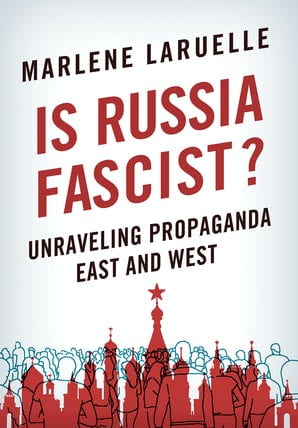In Is Russia Fascist? (Cornell University Press), author Marlene Laruelle argues that the charge of “fascism” has become a strategic narrative of the current world order. Vladimir Putin’s regime has increasingly been accused of embracing fascism, supposedly evidenced by Russia’s annexation of Crimea, its historical revisionism, attacks on liberal democratic values, and its support for far-right movements in Europe. But at the same time, Russia has branded itself as the world’s preeminent antifascist power because of its sacrifices during the Second World War, while emphasizing how opponents to the Soviet Union in Central and Eastern Europe collaborated with Nazi Germany.
By labeling ideological opponents as fascist, regardless of their actual values or actions, geopolitical rivals are able to frame their own vision of the world and claim the moral high ground. Through a detailed examination of the Russian domestic scene and the Kremlin’s foreign policy rationales, Dr. Laruelle disentangles the foundation for, meaning, and validity of accusations of fascism in and around Russia.
About the Author:
Marlene Laruelle is the Director of the Institute for European, Russian, and Eurasian Studies; Director of the Illiberalism Studies Program, Co-Director of PONARS-Eurasia, Director of the Central Asia Program, and Research Professor of International Affairs at George Washington University. Her research focuses on nationalism, ideology and identity in the post-Soviet space, especially on Russia’s conservative landscape and its outreach abroad. She has previously published Russian Nationalism: Imaginaries, Doctrines, and Political Battlefields (Routledge, 2018), and Memory, Politics and the Russian Civil War: Reds versus Whites (Bloomsbury, 2020, with Margarita Karnysheva).
Discussants:
J. Paul Goode is Associate Professor and McMillan Chair of Russian Studies at the Institute of European, Russian and Eurasian Studies. His current research focuses on nationalism and authoritarianism in Russia and the former Soviet states. He is Editor-in-Chief of Communist and Post-Communist Studies and Associate Editor of Nationalities Papers. Yoshiko Herrera is a Professor of Political Science at the University of Wisconsin, Madison. Her research has spanned a variety of topics on Russian politics including nationalism, identity and ethnic politics, political economy and state statistics (national accounts), and international norms. She holds a Ph.D. in Political Science from the University of Chicago.
Anton Shekhovtsov is Director of the Centre for Democratic Integrity (Austria) and Associate Research Fellow at the Swedish Institute of International Affairs (Sweden). His main area of expertise is the European far right and Russian malign influence in Europe. His most recent book is Russia and the Western Far Right (Routledge, 2018). He is the editor of the “Explorations of the Far Right” book series at ibidem-Verlag (Germany) and a member of the Editorial Board of Fascism: Journal of Comparative Fascist Studies. He holds a Ph.D. in Slavonic and East European Studies from University College London.
Moderator:
Henry E. Hale is a Professor of Political Science and International Affairs, and Co-Director of the Program on New Approaches to Research and Security in Eurasia (PONARS Eurasia). He has conducted intensive field research in post-Soviet Eurasia and is currently working on identity politics and political system change, with a focus on public opinion dynamics in Russia and Ukraine. His work has won prizes from the American Political Science Association and the Fulbright Foundation.

